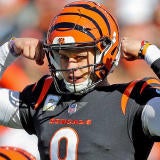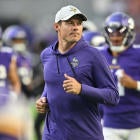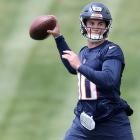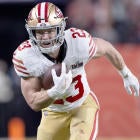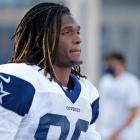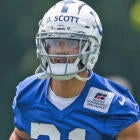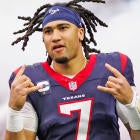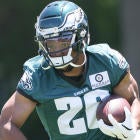Isaac Bruce and the Rams had struggled for several years, so in 1999 they decided to change things.
St. Louis added plenty of firepower in the offseason, including quarterback Trent Green from Washington and running back Marshall Faulk from Indianapolis, but Bruce said perhaps the most important contribution was adding Mike Martz as the offensive coordinator to help head coach Dick Vermeil.
"When I saw those transactions happen on paper, and then we ended up drafting Torry Holt, I was really excited. I think the mood of the team and the city of St. Louis itself was really buzzing by just what we had on paper."
But before the season even started, the Rams were dealt a huge blow when Green went down during the preseason with a torn ACL. That meant that a 28-year-old backup with one NFL game under his belt, a journeyman who had spent time in the Arena Football League and NFL Europe and bagged groceries in the offseason, would have to lead the revamped offense.
His name was Kurt Warner.
"I did know him, but I didn't know him," Bruce said of Warner, who spent the 1998 season with the Rams as the third-string quarterback. "I don't think really any of us knew what he had on the inside of him, but obviously he was there for a reason."
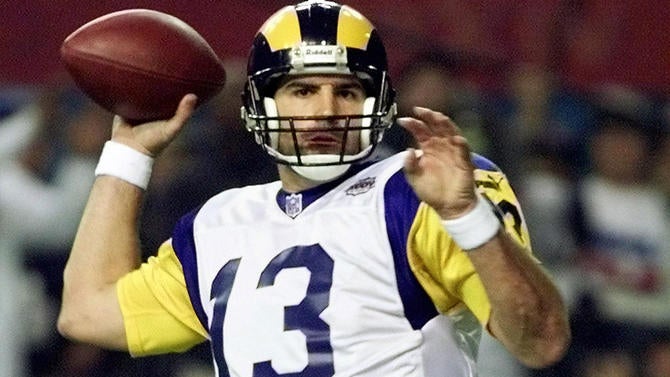
Warner was methodical and quickly picked up on Martz' fast-paced offense thanks to his time spent in the Arena Football League. While he blossomed into a leader on the field, he received plenty of help from a mature Rams group.
"[Warner] didn't have to be the sole leader of the entire team," Bruce said. "You had guys like Torry, guys like Marshall, guys like Orlando Pace who could be there as leaders of their particular groups and get the team going."
The offense wasted no time once the season started, rattling off six straight wins while averaging over 36 points per game. Bruce said a Week 5 win over the 49ers was the point at which he knew the Rams could be special.
"We were confident that we could win some games, but to have it turn out the way it did -- I don't think any of us saw it," Bruce said.
Bruce and Warner's instant connection led to a phenomenal season for both players. Bruce caught 77 passes for 1,165 yards and 12 touchdowns en route to an All-Pro selection. Warner threw for 4,353 yards and 41 touchdowns, which earned him NFL MVP honors in his first season as a starter.
The duo was joined by Faulk, who earned first team All-Pro honors for the first time in his career while rushing for 1,381 yards and seven touchdowns.
"We didn't know exactly everything he had in him until that combination of Faulk and coach Martz got together," Bruce said. "We learned he could catch the ball out of the backfield, he could line up as a wide receiver. He knew the game so well, he was another coach on the field for us. I always called him the engine that made this sports car run."
The offense also received a boost from Holt, a rookie who displayed performance and behavior well beyond his years. He was constantly in the weight room, showed up early and stayed late to catch balls on the JUGS machine. His work ethic and attitude immediately caught Bruce's eye.
"[Holt] had what I call great moxie," Bruce said. "He came in, you could tell he was a seasoned person. He was willing to learn. He mimicked everything that the quote-unquote good players on the team did. He just picked it up."
All those pieces translated to a 13-3 regular season record, what was at the time the second-most total points in an NFL season, and a new nickname: The Greatest Show on Turf.
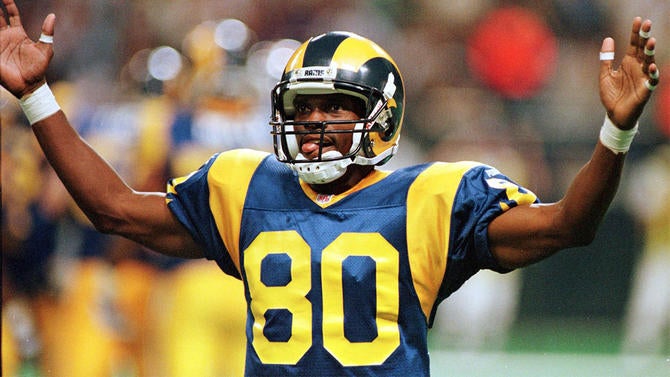
The Rams won two drastically different playoff games -- a wild 49-37 win over the high-flying Vikings and a gritty 11-6 win over the defensive juggernaut Buccaneers -- to reach the Super Bowl.
Playing against the Steve McNair-led Tennessee Titans, the Rams worked their way to a 16-0 lead in the third quarter and the championship was within reach. But the Titans scored six points to close the quarter and as the teams changed sides Bruce walked next to a Titans linebacker.
He had a message for Bruce: "Don't start sizing up your ring just yet."
Before you know it the game was tied, 16-16, and the Rams called a play just before the two-minute warning -- a halfback balloon. It was a play they had used many times during the regular season, designed to get Faulk into open space for an easy reception. But this time, Bruce knew something was different.
"Automatically I knew I was getting the football," Bruce said. "It's normally a play to run everybody down the field and just drop it off to Marshall, let Marshall do his thing. But when I heard the play call I thought, 'Oh yeah, this is it right here. This is my play.'"
Sure enough Warner dropped back and looked towards Bruce, who was running stride-for-stride with his defender down the sideline. Warner decided to throw the ball up, hoping that Bruce would use his tremendous playmaking ability to make something happen. But Warner's arm was hit on the pass, forcing the ball to be short.
Bruce recalls the play like it was yesterday.
"Me being the cunning veteran that I am, I make sure my eyes don't get wide," he said. "I just pretend the ball's not coming, because [the defender] is taught to react off of my body movement."
Bruce came back to make the catch and then pushed off his defender. After that he juked another defender, picked up a clutch block and was off to the races.
"Everything after that goes into super slow motion for me," said Bruce.
He remembers the surreal feeling watching himself on the Jumbotron, seeing both Titans and Rams fans react to the game-changing play. Then he crossed the goal line, a 70-yard touchdown, and he snapped back to reality.
Bruce looked at the scoreboard -- not to see the score, but to see how much time was left.
It ended up being just enough, as McNair led the Titans downfield and hit Kevin Dyson for what was inches away from being a game-tying touchdown, but linebacker Mike Jones made one of the biggest tackles in NFL history.
The Rams' Super Bowl win was the first in franchise history. Bruce reflected on the unselfishness that made the team and that season so special.
"We always got excited about each other's success," he said. "When I'd see Torry get in the end zone or I'd see Marshall get in the end zone, guys getting accolades and awards off the field, we were genuinely excited about it. That's the main thing that made us gel.
"I just look back and see how many guys we had on that team that played unselfish football, which is kind of an anomaly in this day and time."











